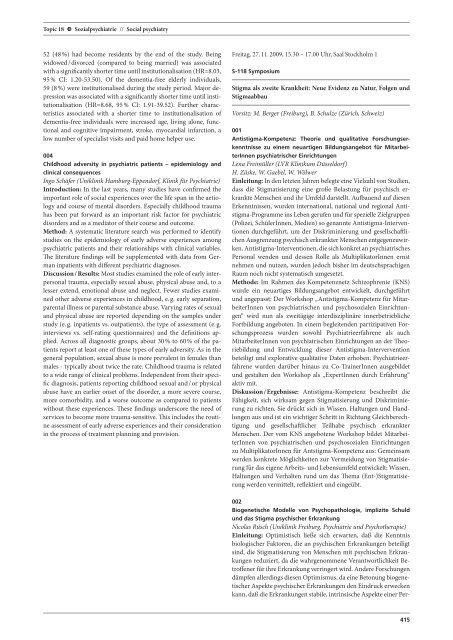Psychische Erkrankungen in der Lebensspanne ... - DGPPN
Psychische Erkrankungen in der Lebensspanne ... - DGPPN
Psychische Erkrankungen in der Lebensspanne ... - DGPPN
Sie wollen auch ein ePaper? Erhöhen Sie die Reichweite Ihrer Titel.
YUMPU macht aus Druck-PDFs automatisch weboptimierte ePaper, die Google liebt.
Topic 18 G Sozialpsychiatrie // Social psychiatry<br />
52 (48 %) had become residents by the end of the study. Be<strong>in</strong>g<br />
widowed / divorced (compared to be<strong>in</strong>g married) was associated<br />
with a significantly shorter time until <strong>in</strong>stitutionalisation (HR=8.03,<br />
95 % CI: 1.20-53.50). Of the dementia-free el<strong>der</strong>ly <strong>in</strong>dividuals,<br />
59 (8 %) were <strong>in</strong>stitutionalised dur<strong>in</strong>g the study period. Major depression<br />
was associated with a significantly shorter time until <strong>in</strong>stitutionalisation<br />
(HR=8.68, 95 % CI: 1.91-39.52). Further characteristics<br />
associated with a shorter time to <strong>in</strong>stitutionalisation of<br />
dementia-free <strong>in</strong>dividuals were <strong>in</strong>creased age, liv<strong>in</strong>g alone, functional<br />
and cognitive impairment, stroke, myocardial <strong>in</strong>farction, a<br />
low number of specialist visits and paid home helper use.<br />
004<br />
Childhood adversity <strong>in</strong> psychiatric patients – epidemiology and<br />
cl<strong>in</strong>ical consequences<br />
Ingo Schäfer (Unikl<strong>in</strong>ik Hamburg-Eppendorf, Kl<strong>in</strong>ik für Psychiatrie)<br />
Introduction: In the last years, many studies have confirmed the<br />
important role of social experiences over the life span <strong>in</strong> the aetiology<br />
and course of mental disor<strong>der</strong>s. Especially childhood trauma<br />
has been put forward as an important risk factor for psychiatric<br />
disor<strong>der</strong>s and as a mediator of their course and outcome.<br />
Method: A systematic literature search was performed to identify<br />
studies on the epidemiology of early adverse experiences among<br />
psychiatric patients and their relationships with cl<strong>in</strong>ical variables.<br />
The literature f<strong>in</strong>d<strong>in</strong>gs will be supplemented with data from German<br />
<strong>in</strong>patients with different psychiatric diagnoses.<br />
Discussion / Results: Most studies exam<strong>in</strong>ed the role of early <strong>in</strong>terpersonal<br />
trauma, especially sexual abuse, physical abuse and, to a<br />
lesser extend, emotional abuse and neglect. Fewer studies exam<strong>in</strong>ed<br />
other adverse experiences <strong>in</strong> childhood, e. g. early separa tion,<br />
parental illness or parental substance abuse. Vary<strong>in</strong>g rates of sexual<br />
and physical abuse are reported depend<strong>in</strong>g on the samples un<strong>der</strong><br />
study (e. g. <strong>in</strong>patients vs. outpatients), the type of assessment (e. g.<br />
<strong>in</strong>terviews vs. self-rat<strong>in</strong>g questionnaires) and the def<strong>in</strong>itions applied.<br />
Across all diagnostic groups, about 30 % to 60 % of the patients<br />
report at least one of these types of early adversity. As <strong>in</strong> the<br />
general population, sexual abuse is more prevalent <strong>in</strong> females than<br />
males - typically about twice the rate. Childhood trauma is related<br />
to a wide range of cl<strong>in</strong>ical problems. Independent from their specific<br />
diagnosis, patients report<strong>in</strong>g childhood sexual and / or physical<br />
abuse have an earlier onset of the disor<strong>der</strong>, a more severe course,<br />
more comorbidity, and a worse outcome as compared to patients<br />
without these experiences. These f<strong>in</strong>d<strong>in</strong>gs un<strong>der</strong>score the need of<br />
services to become more trauma-sensitive. This <strong>in</strong>cludes the rout<strong>in</strong>e<br />
assessment of early adverse experiences and their consi<strong>der</strong>ation<br />
<strong>in</strong> the process of treatment plann<strong>in</strong>g and provision.<br />
Freitag, 27. 11. 2009, 15.30 – 17.00 Uhr, Saal Stockholm 1<br />
S-118 Symposium<br />
Stigma als zweite Krankheit: Neue Evidenz zu Natur, Folgen und<br />
Stigmaabbau<br />
Vorsitz: M. Berger (Freiburg), B. Schulze (Zürich, Schweiz)<br />
001<br />
Antistigma-Kompetenz: Theorie und qualitative Forschungserkenntnisse<br />
zu e<strong>in</strong>em neuartigen Bildungsangebot für MitarbeiterInnen<br />
psychiatrischer E<strong>in</strong>richtungen<br />
Lena Freimüller (LVR Kl<strong>in</strong>ikum Düsseldorf)<br />
H. Zäske, W. Gaebel, W. Wölwer<br />
E<strong>in</strong>leitung: In den letzten Jahren belegte e<strong>in</strong>e Vielzahl von Studien,<br />
dass die Stigmatisierung e<strong>in</strong>e große Belastung für psychisch erkrankte<br />
Menschen und ihr Umfeld darstellt. Aufbauend auf diesen<br />
Erkenntnissen, wurden <strong>in</strong>ternational, national und regional Antistigma-Programme<br />
<strong>in</strong>s Leben gerufen und für spezielle Zielgruppen<br />
(Polizei, SchülerInnen, Medien) so genannte Antistigma-Interventionen<br />
durchgeführt, um <strong>der</strong> Diskrim<strong>in</strong>ierung und gesellschaftlichen<br />
Ausgrenzung psychisch erkrankter Menschen entgegenzuwirken.<br />
Antistigma-Interventionen, die sich konkret an psychiatrisches<br />
Personal wenden und dessen Rolle als MultiplikatorInnen ernst<br />
nehmen und nutzen, wurden jedoch bisher im deutschsprachigen<br />
Raum noch nicht systematisch umgesetzt.<br />
Methode: Im Rahmen des Kompetenznetz Schizophrenie (KNS)<br />
wurde e<strong>in</strong> neuartiges Bildungsangebot entwickelt, durchgeführt<br />
und angepasst: Der Workshop „Antistigma-Kompetenz für MitarbeiterInnen<br />
von psychiatrischen und psychosozialen E<strong>in</strong>richtungen“<br />
wird nun als zweitägige <strong>in</strong>terdiszipl<strong>in</strong>äre <strong>in</strong>nerbetriebliche<br />
Fortbildung angeboten. In e<strong>in</strong>em begleitenden partizipativen Forschungsprozess<br />
wurden sowohl Psychiatrieerfahrene als auch<br />
MitarbeiterInnen von psychiatrischen E<strong>in</strong>richtungen an <strong>der</strong> Theoriebildung<br />
und Entwicklung dieser Antistigma-Intervervention<br />
beteiligt und explorative qualitative Daten erhoben. Psychiatrieerfahrene<br />
wurden darüber h<strong>in</strong>aus zu Co-Tra<strong>in</strong>erInnen ausgebildet<br />
und gestalten den Workshop als „ExpertInnen durch Erfahrung“<br />
aktiv mit.<br />
Diskussion / Ergebnisse: Antistigma-Kompetenz beschreibt die<br />
Fähigkeit, sich wirksam gegen Stigmatisierung und Diskrim<strong>in</strong>ierung<br />
zu richten. Sie drückt sich <strong>in</strong> Wissen, Haltungen und Handlungen<br />
aus und ist e<strong>in</strong> wichtiger Schritt <strong>in</strong> Richtung Gleichberechtigung<br />
und gesellschaftlicher Teilhabe psychisch erkrankter<br />
Menschen. Der vom KNS angebotene Workshop bildet MitarbeiterInnen<br />
von psychiatrischen und psychosozialen E<strong>in</strong>richtungen<br />
zu MultiplikatorInnen für Antstigma-Kompetenz aus: Geme<strong>in</strong>sam<br />
werden konkrete Möglichkeiten zur Vermeidung von Stigmatisierung<br />
für das eigene Arbeits- und Lebensumfeld entwickelt; Wissen,<br />
Haltungen und Verhalten rund um das Thema (Ent-)Stigmatisierung<br />
werden vermittelt, reflektiert und e<strong>in</strong>geübt.<br />
002<br />
Biogenetische Modelle von Psychopathologie, implizite Schuld<br />
und das Stigma psychischer Erkrankung<br />
Nicolas Rüsch (Unikl<strong>in</strong>ik Freiburg, Psychiatrie und Psychotherapie)<br />
E<strong>in</strong>leitung: Optimistisch ließe sich erwarten, daß die Kenntnis<br />
biologischer Faktoren, die an psychischen <strong>Erkrankungen</strong> beteiligt<br />
s<strong>in</strong>d, die Stigmatisierung von Menschen mit psychischen <strong>Erkrankungen</strong><br />
reduziert, da die wahrgenommene Verantwortlichkeit Betroffener<br />
für ihre Erkrankung verr<strong>in</strong>gert wird. An<strong>der</strong>e Forschungen<br />
dämpfen allerd<strong>in</strong>gs diesen Optimismus, da e<strong>in</strong>e Betonung biogenetischer<br />
Aspekte psychischer <strong>Erkrankungen</strong> den E<strong>in</strong>druck erwecken<br />
kann, daß die <strong>Erkrankungen</strong> stabile, <strong>in</strong>tr<strong>in</strong>sische Aspekte e<strong>in</strong>er Per-<br />
415


